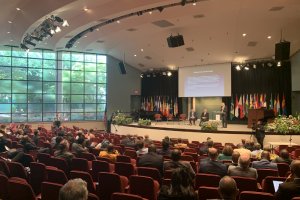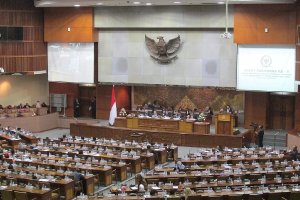Facing intense pressure from faith leaders across Europe’s Christian, Jewish and Muslim communities, as well as parliamentarians, national representatives, scholars and civil society, the European Commission has decided to restore the position of Special Envoy to promote Freedom of Religion or Belief outside the European Union.

The step has been widely welcomed amid concerns that discontinuing a vital post designed to protect religious freedom around the world on behalf of the EU could bolster bigotry at a time when religious oppression continues to gravely threaten many countries.
Following months of silence, the European Commission, the European Union’s politically independent executive branch, announced it will renew the Special Envoy’s position, whose mandate ceased in November 2019 when the term of Slovak politician and former EU commissioner Ján Figel’ came to an end and the position was eliminated.
Figel’ is believed to have played a key role in helping a Pakistani Christian woman, Asia Bibi, seek asylum in Canada in May 2019 after the Pakistan Supreme Court overturned her death sentence in a prominent blasphemy case. He is the only person to have held the post of Special Envoy since it was created in 2016 in the wake of atrocities against religious minorities in Iraq and Syria by Islamic State terrorists. The European Commission has not said whether Figel’ or someone else will occupy the restored Special Envoy position.
The announcement of the post’s restoration came in the form of a July 8 Twitter message by European Commission Vice-President Margaritis Schinas. “We decided today to renew the function of Special Envoy for the promotion of freedom of religion or belief outside the EU,” the message stated, adding that “the forthcoming appointment,” together with the consent of European Commission President Ursula von der Leyen of Germany, “shows our determination to ensure the rights of ALL faiths and beliefs are respected across the world.”
Evangelical Focus, a news website that focuses on “current issues in Europe to help build bridges between evangelical churches and all of society,” said in a July 8 post that “the surprising announcement has been welcomed as good news by politicians, human rights groups and religious freedom organizations,” which had “fervently asked the EU not to forget the promotion of religion or belief outside its borders.”
Rabbi Pinchas Goldschmidt, the Chief Rabbi of Moscow, Russia, and the president of the Conference of European Rabbis, said in a July 5 interview with the German news agency Deutsche Welle that abolishing the Special Envoy’s post sent “the wrong signal” at a time when “Jews and other religious minorities are increasingly being targeted online and offline by extremists, and the free exercise of religion is being undermined.”
Another critical voice that appears to have contributed to the European Commission’s decision to renew the Special Envoy position is that of Aiman Mazyek, chairman of the Central Council of Muslims in Germany.
“Jews and other religious minorities are increasingly being targeted online and offline by extremists, and the free exercise of religion is being undermined.”
Referring to attempts in some European nations to outlaw the wearing of headscarves and the slaughter of animals in keeping with certain religious practices, Mazyek suggested in the Deutsche Welle article that if religious freedom is threatened even within Europe, it’s “all the more important that the voice of such an envoy is not silenced particularly now.”
The importance of retaining the Special Envoy position was also highlighted in the Deutsche Welle article by Metropolitan Augustinos, the highest-ranking figure of the Eastern Orthodox Church in Germany. Alluding to attempts by Turkish President Recep Tayyip Erdoğan to convert Istanbul’s globally renowned Hagia Sophia museum into a mosque, Augustinos said the controversy—before Hagia Sophia was turned into a museum in 1935, it was a 6th-century cathedral Ottoman Turks later converted into a mosque—is an example of the value of having a Special Envoy who could clearly emphasize widespread European opposition to Turkish nationalist efforts to turn the historic site into a mosque once again.
The European Commission’s decision last month to abolish the Special Envoy position also came in for bipartisan criticism from 135 members of Germany’s Parliament. According to The Tablet, a UK-based Catholic news site, German parliamentarians from various parties “urged their country to use its new tenure of the EU’s rotating presidency to press for restoration of the post.” Other conservative members of the European Parliament made similar demands in a letter to European Commission President Von Der Leyen, the news outlet said.
Last month, the European Commission wrote to the International Religious Freedom Roundtable in Brussels, which has supported the renewal of the Special Envoy’s position, saying that while the EU Commission is committed under 2013 guidelines to advancing religious freedom, the position of Special Envoy would be dismantled and that violations would henceforth be “monitored and raised regularly by EU delegations” as well as the EU’s Special Representative for Human Rights, Eamon Gilmore.
Soon after Figel’ lost his one-year renewable mandate, a variety of religious liberty advocates, nongovernmental organizations and human rights publications petitioned Commission President Von Der Leyen, requesting that the Special Envoy’s position be restored, according to a July 11 article in Bitter Winter, a prominent multilingual magazine devoted to exposing religious persecution of all stripes in China. “At that time, wrote Bitter Winter, Editor-in-Chief Marco Respinti, “we speculated that the affair might have something to do with the intention of the EU to avoid direct confrontation with important countries of the world whose record on human rights and religious liberty is quite poor.”
From its beginnings, the Church of Scientology has recognized that freedom of religion is a fundamental human right. In a world where conflicts are often traceable to intolerance of others’ religious beliefs and practices, the Church has, for more than 50 years, made the preservation of religious liberty an overriding concern.
The Church publishes this blog to help create a better understanding of the freedom of religion and belief and provide news on religious freedom and issues affecting this freedom around the world.
For more information, visit the Scientology website or Scientology Network.


